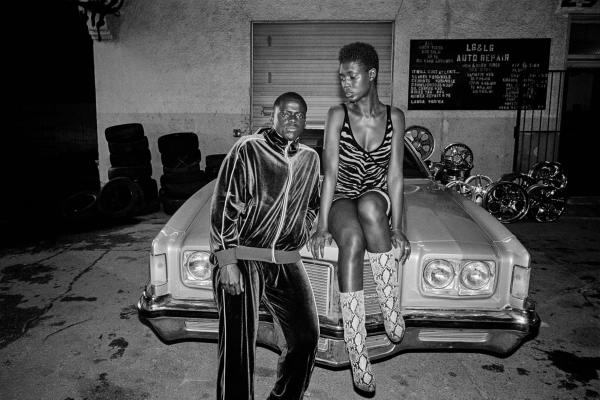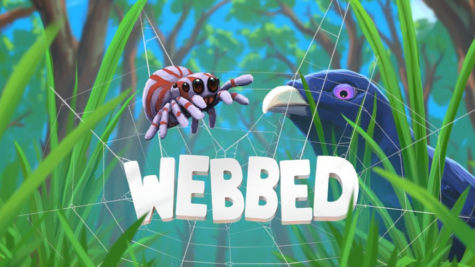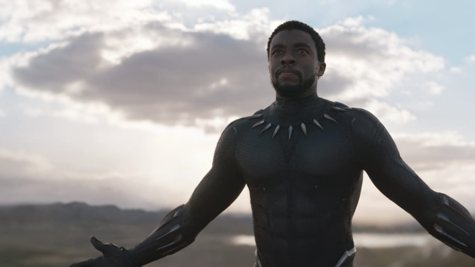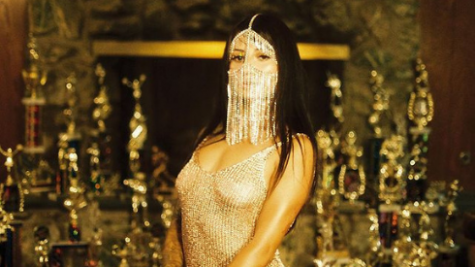Everybody plays: A look at video games’ most outspoken critic, why her arguments for change of gender tropes are misguided
March 15, 2015
To advocate for an issue that you’re passionate about is admirable, however, to demonize an entire group of people in the name of the issue your advocating for is completely and utterly wrong.
Take that mindset and apply it to one of the most controversial pop culture issues surrounding one of the most popular forms of entertainment and you’ll end up being knocked out so fast you swear you’re in “Street Fighter.”
The Gamergate controversy started in August 2014 when the scorned ex-boyfriend of indie game developer Zoe Quinn made a long blog post detailing their break up and accused her of a number of things including a relationship with Kotaku journalist Nathan Grayson.
Gamergate has sparked somewhat of an uproar in the gaming community and has made various figures such as Quinn and developer Brianna Wu bring up issues such as sexism, gamer identity and misogyny.
However, both Quinn and Wu have been relatively quiet compared to gaming’s most infamous outspoken critic – current gaming public enemy number one: Anita Sarkeesian.
Through her website and YouTube account Sarkeesian’s commentary on video games, called “Tropes vs. Women in Video Games” discusses famous gaming tropes such as the damsel in distress, the sexual object and the background character.
Sarkeesian’s bare bones argument about how there should be more women characters in video games – on top of the already long laundry list there are – is completely valid and is something that most, if not all, gamers are in completely favor of.
Where Sarkeesian’s argument falls flat is when she attacks and accuses gamers and developers of being sexist and misogynistic just for playing or developing a game that has even an ounce of sexualizing women or having violence against them.
“It gets worse and worse,” Sarkeesian said in an interview with ABC News. “It reinforces this idea that women are sexual objects… it reinforces the idea of women as um playthings for amusement.”
It almost goes without saying that Sarkessian’s strong comments, critiques and analysis against gaming has gotten her a lot of negative reactions and backlash. Sarkeesian, like everyone else in this world, has every right to voice her opinion, no matter how wrong or flawed her analysis about games and gamers might be.
However, gamers and developers also have the right to respond to her allegations of sexism and misogyny. The problem is that a very very small percent of gamers and “trolls” take things way too far, bombarding Sarkeesian, Quinn and Wu with a multitude of death and rape threats.
One of the most famous cases happened in October 2014 when Sarkeesian was to speak at the Utah State University. The university received terrorist threats from a person perpetuating a student. The letter-writer said they would commit “the deadliest school shooting in American history,” and cited the 1989 Montreal Massacre as inspiration.
That threat was just one of many threats that Sarkeesian and company get on an almost daily basis. Death and rape threats like these are proving her point that gamers are sexists and misogynists that only want gaming to be some sort of a “boys club,” which, on the grander scale of gaming is false.
If the small percentage of gamers and trolls really want to make a statement about Sarkeesian’s skewed critiques and analysis then they would stay silent.
Silence speaks volumes. If they would just keep their mouths shut and log off of whatever social media site they frequent then Sarkeesian and her war against tropes would just go away and fade out. However, that doesn’t mean that Sarkeesian can completely escape criticism.
For Sarkeesian to call an entire group of people, both male and female, sexist for killing random woman character A on the street in “Watch Dogs ”or for picking up a prostitute in an off-brand knock off of a Ferrari the “Grand Theft Auto” franchise is completely absurd.
Objectives such as these examples are almost always optional when playing a game. No one is going to hold a computer generated coded gun to your characters head and make them do any of those things. It’s all up to the player, which brings in a discussion of the person playing, not video games at large.
To accuse developers of being misogynists because they have sexy female fan service characters or the token female character is illogical. By that conclusion, that would mean that the developers of games such as the “Call of Duty” and “Wolfenstein” franchises are Nazi sympathizers for featuring Nazi figures in their games. It would mean that Juliet Starling of “Lollipop Chainsaw” would just be that sexy blonde all-American cheerleader sucking on lollipops and not the fierce chainsaw wielding, limb maiming, decapitating zombie slayer that she is in the game.
The fact is, none of these age-old video game tropes are going away anytime soon.
Mario is always going to save Princess Peach, there’s always going to be those random side characters with extraordinary “jiggle” physics that serve absolutely no purpose but to be looked at, killing random characters A and B is always going to an optional objective and the one of the most iconic and fierce video game characters – Samus – is always going to be female.













Jenny.S • Apr 9, 2015 at 2:48 am
A good fair and balanced article for a change.
I’ve been a gamer for years and games communities are not like Sarkeesian describes them. I think that’s why the kick back against the lies has been so big.
Ausyarr • Apr 8, 2015 at 11:44 pm
Great article.
What I do not understand is why larger media outlets have not even tried to debunk her arguments. Even if one was to agree with her, a rigorous debate can only strengthen them if there valid.
Sonya • Apr 8, 2015 at 8:39 pm
It’s a great article, and one of the most accurate on #GamerGate in the past 8 months. However, it should be noted that it’s not two sides. The trolls who send threats to Anita and others know that it harms Gamers. That’s why they’re doing it. They’re a third side of mudslingers and trolls who just want to see the chaos. They’re emboldened by the reactions, and the fact that their actions are continually blamed on #GamerGate supporters.
Clayton "BHXSpecter" Weaver • Apr 8, 2015 at 1:28 pm
“Silence speaks volumes.” History shows us that being silent can have a deadly outcome. For example:
“First they came for the Socialists, and I did not speak out—
Because I was not a Socialist.
Then they came for the Trade Unionists, and I did not speak out—
Because I was not a Trade Unionist.
Then they came for the Jews, and I did not speak out—
Because I was not a Jew.
Then they came for me—and there was no one left to speak for me.”
Granted gaming is a hobby and nothing as deadly, but that is the mentality the journalists have had with their wide spread gamers are dead type articles. This whole controversy has gone on longer than it should be because of the lies Anita and her ilk have spewed. GG isn’t untouchable either as there have been people hiding in the ranks of the hashtag that have attacked women. That said, there are cases of women and men on both sides being attacked by trolls and shouldn’t be blamed on an entire group (like Sarah Butts (Nyberg) has been doing with her tweets). The individuals should be held accountable and not the group, but sadly there are too many that have the mindset that the group has to answer for the actions of an individual. The smear campaign against GamerGate was bad, but the continued campaign to smear them even with the evidence showing they aren’t a hate group is astounding. Charities, ethics policy changes on several sites, and the support of several indie devs and groups like The Fine Young Capitalists are the positives that are being pushed aside in favor of running the actions of individuals that help prove Anita’s point (even though a study was just released that states Anita is wrong in her claims of games making gamers sexist).
Alex • Apr 8, 2015 at 10:45 am
Great article, bout time real journalists speak about the fake ones out there!
Ryan Arko • Apr 8, 2015 at 6:37 am
This is the basis for much of the frustration between gamers and Anita Sarkeesian. She’s spent years demonizing video games when she doesn’t play them and pushes a narrative that just playing them would cause her to rip off someone’s head.
This is a person who made almost $160,000 talking about how much of a gamer she is and how much passion she has for the industry then makes video after video, talk after talk, demonizing games.
Then she selectively takes aggro responses and says “this is every gamer ever.”
Mario was not about rescuing Princess Peach of the Mushroom Kingdom or Daisy of Sarasaland. The issue with the older gen games being critiqued today is that the people who speak on them negatively never had the game when it came out. And they likely never picked up a game controller until after the new millennium. So they never saw the instruction booklets that told the contextual stories.
Mario was trying to stop Tatanga from controlling Sarasaland. Tatanga took over the Kingdom and wanted to solidify his power by marrying Daisy. He had to stop Tatanga and rescuing Daisy (who had nobody else to help her escape) was a major component in stopping him. In the Mushroom Kingdom, King Koopa wanted to rule. To do it, he held the King’s only daughter Peach hostage. Mario was tasked with defeating Koopa and returning the princess.
We can even turn to the blatant misconception (or willfully ignorant) that Zelda is a damsel in distress trope because the story is set that Ganon wants to rule the world and it’s up to Link to stop him. Ganon kidnapped Zelda because she had ties to the TriForce that he possessed. Her fate isn’t known until you make it to her. But rescuing her was never the mission in the story from the games initial release.
But Anita Sarkeesian and many of the current game journalists aren’t gamers. Sarkeesian admits she hates games, and sites like Polygon and Gamasutra are staffed by people who didn’t start playing games until it became culturally acceptable and they’ve spent every minute since trying to appropriate it.
Now that there is a significant study showing no link between gaming and sexism, coupled with the other major studies that show no link between gaming and increase in violence, we can rest knowing that Anita Sarkeesian has been lying for money for years pushing a narrative that demonizes an industry she doesn’t even care about while painting all gamers as white, male fedora-wearing neck-bearded misogynists living in their mothers’ basements.
Sarkeesian’s attack on gamers word for word hasn’t changed from the insults gamers got from the “cool” kids when gaming wasn’t something anyone but geeks played. And in a modern world, this supposedly progressive woman took a worldwide diverse group that outnumbers Muslims or Catholics and reduced their identity to a longheld stereotype, and denied them agency.
David • Apr 8, 2015 at 1:32 am
There are hundreds of strong female characters in games. Sarkeesian just acts like they don’t exist.
On the topic of GamerGate, Sarkeesian has lied quite a bit. The story was never about her. About a month into the story, she just tweeted something like, “Let’s be honest, the same people who have been harassing me for two years are GG.” No evidence, just her say so.
The idea that tens of thousands, perhaps hundreds of thousands of people came together to harass a couple of women or all women out of the gaming industry is insane. After about a month or two there was a list going around of people on the GG hashtag being doxxed and threatened. There were over 20 people on that list. I didn’t recognize all the names, but I did recognize seven of them being women. People were getting emails with their personal information attached and threatened with it being leaked if they didn’t stop tweeting about GG, or with their family’s info being leaked. One woman posted an email where she was threatened with rape if she didn’t stop tweeting about GG. These are just the people who had the courage to screenshot their emails. Who knows how many stopped right after to protect themselves or their families from being harassed.
And that brings me back to Anita Sarkeesian. Due to all the doxxing and threatening going on by what is likely third party trolls looking to stir up trouble, people on the GG hashtag started flagging any accounts making threats or breaking twitters rules and reporting them regardless of which side of the issue they were on. Someone was threatening Sarkeesian by making account after account on twitter. GG would report this person and get his account suspended and he’d create another. Someone eventually traced who it was, and it turned out to be a games journalist in Brazil. This was all before the USU threats. So at some point the authorities were contacted by the person who traced him and the authorities told him that unless Sarkeesian made the complaint herself, they could do nothing. So multiple people on the GG hashtag tried to inform Sarkeesian that they have information about one of their harassers so she could inform the authorities. These people were blocked and/or ignored by Sarkeesian. Now why would someone do that? Because with her harassers free, she can frame their tweets and gain sympathy. She also can’t go on a media tour and accuse GG of harassing and threatening women if they helped her catch one of her harassers, could she? She also made more than $400,000 last year. Most of it around the time of the GG scandal. Do you think that is enough of a motive to lie?
On top of that, this could be the same person who sent the USU threats. Don’t you think the students of that University deserve some closure or at least to know the threat was made by some troll on the internet? Regardless of who sent that threat, it was determined by state and federal authorities not to be credible. The person who wrote that email claimed to be a student there, but then signed it as the name of some youtuber who doesn’t go to school there and has only made one video critical of her. After USU released a statement talking about how they worked with authorities to determine the threat wasn’t credible but still increased security, Sarkeesian backtracked on the reason she didn’t give the speech. She went on to complain about Utah’s conceal carry laws, and went on to further say that no one should give speeches at USU until they change their gun laws. So it appeared the reason she really quit had to do with being politically anti-gun.
There’s even more on Sarkeesian that I could get into to show how she lies and manipulates people. There’s also enough to call into question Brianna Wu and Zoe Quinn’s credibility. People just have to be willing to investigate and find out the truth about who these people are and how they’ve acted during this whole thing. All three of these women have made so much money off this controversy as well. Setting the games industry back all so they can gain fame and money. There are millions of women playing video games. There are thousands developing games. There are hundreds if not thousands of strong female characters throughout many different games.
Tom Jones • Apr 7, 2015 at 7:25 pm
Great article! However, It was Utah State University, not the University of Utah.
Thomas Fairfield • Apr 7, 2015 at 7:25 pm
I passionately salute you for having the courage to touch something many are now afraid to touch, as I was essentially bullied off a forum for it. I’m in San Diego, would you be interested in getting some insider perspective on this?
Mathew King • Apr 7, 2015 at 7:02 pm
this seems a fairly accurate, concise, and intelligent critique of her and some of the issues surrounding her, without kneeling at her alter or trying to burn her at the stake, so, im gonna whitelist this site in adblock, maybe have a look at some other articles, and i hope you have a nice day.
ladygaymer • Apr 7, 2015 at 7:01 pm
this is a very refreshing take on Anita, her crazed group of ‘activists’ and the damage she is doing to the gaming industry. As a female gamer that has been gaming since sonic the hedgehog, I really resent what her and her enabling type put out there as ‘information’ and ‘facts’. She also mastered the power of branding games as misogynistic and how it’s given her influence and power she 100% doesn’t deserve. People in the industry stand behind her because they don’t want their games or companies to be labeled misogynistic. It’s very sad and even more frustrating to watch.
Her opinions should be allowed, of course. Everyone’s allowed an opinion. But they should never have been viewed as anything more than youtube video game opinions lite.
Lastly, Anita and her community like to brand anyone who offers light criticism a sexist (I’m a woman BTW) . So I am positive that those who stand behind her will read this and assume I hate my own kind. I don’t, but I strongly believe Anita Sarkeesian should be taken with a grain of salt.
Techni • Apr 7, 2015 at 6:48 pm
Anita has posted examples of what she considers harassment. Some have been polite disagreement, of which she doxxed the author of course. She wants everyone who disagrees with her to be silent, cause disagreeing = harassment to her.